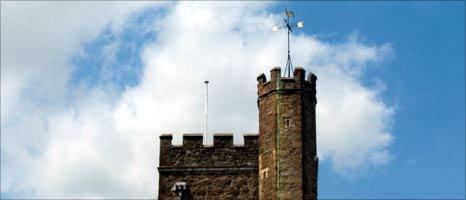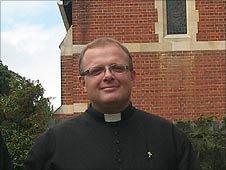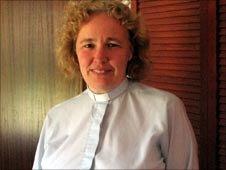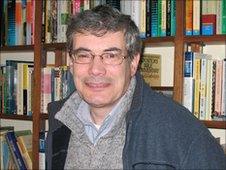Views differ on women bishops compromise bid
- Published

Churches often sport weathervanes, like this one at Seal. But are the Archbishops pointing the right way?
The law allowing women to be made bishops in the Church of England goes before the Church's General Synod on 9 July after a last-minute intervention by the Archbishops of Canterbury and York.
Rowan Williams and John Sentamu want, at this late stage, to avert a split over the authority of the "complementary bishops" nominated to look after those parishes which do not agree with the appointment of women.
In Sevenoaks, Kent, where the BBC News website has been following the debate, external, opinions differ on whether the Archbishops have done enough.

Fr Ivan Aquilina says he is not interested in a "trade-in"
They are proposing, external that a female bishop would have full authority in her diocese but "in practice refrain from exercising" certain functions in a parish which objected to her.
Any "complementary bishop" would have jurisdiction derived from the law, not from delegation - and the powers of the two bishops would be "co-ordinate".
Father Ivan Aquilina, vicar of St John the Baptist's church in Sevenoaks, says that he can see the generosity of the Archbishops' proposal, but it does not address the real point at issue.
"I think they are sticking their necks out as they strive to find a political solution, where they keep everyone happy," he says. "And this is a theological problem."
Equal jurisdiction
St John's is a parish in the Anglo-Catholic tradition, whose adherents deeply revere the ceremonial aspects of the Church. Many Anglo-Catholics deny that a woman can exercise the sacramental role of a priest or a bishop.
Under the Archbishops' plan, "a bishop of the diocese, whether he or she, would have equal jurisdiction to a nominated bishop", says Fr Aquilina.
"So they're going to force me indirectly to accept that a woman bishop has jurisdiction, and that's why we need to go back to the original problem - can a woman be a bishop?
"If they are going to ask me to accept the jurisdiction of a woman bishop as a trade-in so I can have my own bishop then I'm not interested, because that is not the Faith Catholic."

"I think it may be a desperate ploy," says the Rev Anne Le Bas
Two miles north-east of St John's, the Reverend Anne Le Bas, priest-in-charge of St Peter and Paul's church, Seal, a supporter of women bishops, holds remarkably similar views to Fr Aquilina's on the Archbishops' intervention.
"I can understand that the Archbishops are desperate to find a way of holding people together," she says, adding: "I applaud their intention.
"But I think it may be a desperate ploy that isn't going to work."
Dr Williams and Dr Sentamu are trying to make the authority of the "complementary bishop" come from the Church as a whole, not the diocesan bishop.
'No magic wand'
But, says she says, the Church as a whole includes women among the clergy and - if the measure went through - would soon have them among the bishops too.
"For those who care about these things passionately and would be leaving because of women in the episcopate, I can't see how that's going to help them.
"I can't see any advantage for women in the Archbishops' amendment... if I really got the sense that the amendment was going to be the magic wand that would take away all the anxieties of those who are worried then I suppose it might be worth it, but I don't think that's going to happen."
Instead it will cause complications in the future, she fears.
However, the Reverend Angus MacLeay, rector of St Nicholas' church, says he welcomes the Archbishops' proposal as "a very constructive way forward".
St Nicholas, the ancient parish church of Sevenoaks, is a bastion of the conservative evangelical wing of the Church which has been the other source along with Anglo-Catholicism of opposition to women priests and bishops.
Many conservative evangelicals believe the Bible requires male "headship" in the Church. Mr MacLeay co-signed a letter from scores of evangelical clergy saying the proposals before the Synod were a mistake and holding out the possibility of moves towards autonomy.

The Rev Angus MacLeay sees deep problems if Archbishops are ignored
The proposal before the Archbishops intervened, he says, "would certainly cause difficulties for many evangelicals". Although evangelical parishes could request a male bishop to look after them, if that bishop's powers came from a female diocesan bishop she would be exercising "headship" over him.
But he now says: "I would be delighted to explore the route that the Archbishops have set out."
He feels Dr Williams and Dr Sentamu are trying "through a process of generosity on each side" to have the best of both worlds, giving due authority both to the diocesan bishop and the complementary bishop.
Their idea of "co-ordinate jurisdiction" could satisfy his concerns about male headship, he believes.
Meanwhile, the Church is being given a clear lead by the two senior Bishops, who are trying to be as generous as they can, he adds, and warns: "If that is rejected, then it highlights that there are some very deep problems within the Church at the moment."